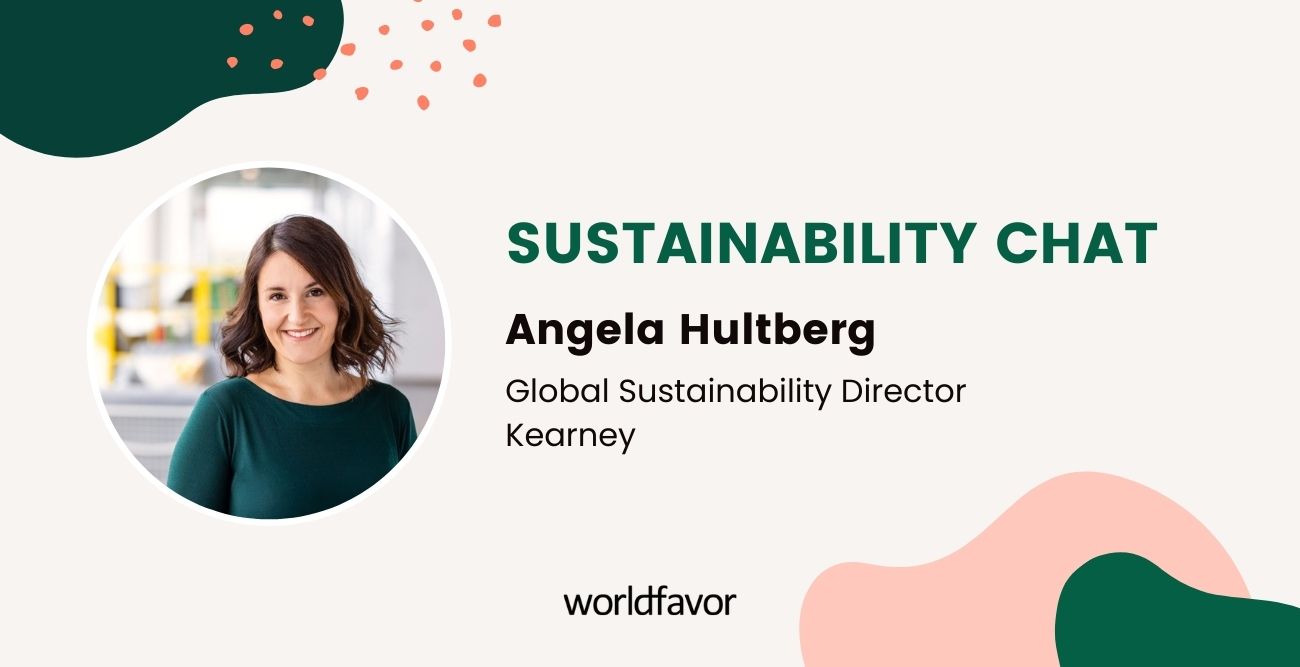Sustainability Chat with Angela Hultberg, Global Sustainability Director at Kearney
In our Sustainability Chat series, we speak with leaders and dreamers in the world of sustainability – picking their brains on what drives them, their experiences working in the field, plus all the best tricks of the trade.

For this Sustainability Chat, we had the pleasure of talking to Angela Hultberg, Global Sustainability Director at Kearney, a global management consulting company.
Angela advises Kearney’s clients on sustainability strategy and adoption with a specific focus on the automotive, transport and retail sectors, as well as a variety of managerial roles driving and shaping sustainable strategic directions tailored for Kearney’s clients. Angela previously worked at the IKEA Retail (Ingka Group) Global Sustainability team as Head of Sustainable Mobility. Prior to her work at IKEA, Angela was appointed Road Transport Lead for the COP26 Climate Champions team.
You started working with Sustainability back in 2016, what led up to that moment and what has been your main motivator during your career in the field of sustainability?
I actually don’t come from sustainability, so to speak. Didn’t study it, and spent the first years of my career not thinking about it too much. I had a bit of a personal interest, but nothing beyond the ordinary to be honest. But then I came to work for a company where sustainability was deeply embedded in every day operations. And the more I learned, the more I could connect it to the business knowledge I had, and I realized that this was where I wanted to be.
Sustainability to me is the biggest business risk, the biggest business opportunity and the biggest transformation we’ve seen in decades, of course I wanted to be part of that! I truly believe that being a good business means doing good business, and if I can make the world a little better by helping companies become more people and planet friendly… What could be a bigger motivator than that?
Have you noticed any major shifts in sustainable business practices during these past years? What do you think these have originated from?
Oh yes, sustainability has for sure moved from a nice to have to a need to have. It’s a cliché, but it’s true. Regulation, customer expectations, supply chain risks, investor priorities, all are pushing businesses towards better practices. There are also increased demands of transparency, and harmonized frameworks and reporting systems are emerging, all enabling as well as pushing companies to better understand their impact.
I also think we are seeing the gap between leaders and laggards growing, with COP26 definitely highlighting that. If you have not started to transition to more sustainable business practices yet, you’ll have to run fast just to catch up. Basically, at this point, every Euro spent without a sustainability impact is a Euro wasted.
You just got appointed Global Sustainability Director at Kearney after being at IKEA Retail (Inka group) for several years. What is your key focus going to be moving forward?
My key focus is very straight forward – I want to support companies on their journey to transition to become a truly sustainable business. Regardless of where they are on that journey, they will have most of the work ahead of them, that we know for sure. So regardless of if we’re talking about organizing and setting the right KPIs and metrics to follow up on their efforts, or circular business models, or responsible sourcing, or measuring social ROI, I’m very excited to get in there and get going!
During your career, your focus has been clean transportation. Transport has been pinpointed as one of EUs biggest climate problems, as it accounts for 27% of Europe's GHG emissions. A lot of research points to the fact that transportation needs to be decarbonized by 2050 to be able to reach the Paris climate agreement. What, according to you, are concrete things that companies need to do for this to happen?
Decarbonizing transportation is not easy, but it’s not brain surgery either. Companies need to invest in an electric fleet and renewable energy to charge it. Especially when addressing the last mile, because with growing ecommerce comes a growing number of delivery vehicles. This means we need to build out the charging infrastructure too.
Governments, or even local policy makers can make this happen faster by introducing emissions standards and zero emission zones. Companies need to use biofuels where EVs are not feasible, like for long haul (where EVs are hitting the market already), shipping and aviation. We need scale to lower cost, and the only way to do that is to really get going and deploy at large volumes.
Lastly, there are a lot of things happening within sustainability. What is the most exciting thing happening according to you?
So hard to name only one! The most exciting thing to me I think is to see how everything is coming together. There is not a single topic, operation, aspect of a business that doesn’t come with a sustainability angle, and people are realizing that. Ecommerce, attracting young talent, rising energy prices, spotlight on human rights, urbanization, digitalization, all of it leads to the same conclusion. We must change if we want to stay in business. Because those who won’t will be the Kodaks of the 2020s. And honestly, if we don’t manage we are all done. There can be no business on a dead planet after all.
If you liked this Sustainability Chat and want to stay updated on our future guests, please subscribe to our newsletter. We can guarantee exhilarating chats with sustainability profiles you don’t want to miss!
Related blog post you might like:
- Sustainability Chat with Stefan Nilsson, Director of Sustainability and ESG at Foxway Group
- Sustainability Chat with Cecilia Lenbäck, Manager of Food & Beverage at KRAV
- Sustainability Chat with Marie Baumgarts at SEB





%20as%20the%20deadline%20approaches.%20Learn%20about%20compliance%20requirements%2c%20potential%20delays%2c%20and%20key%20updates..png)

